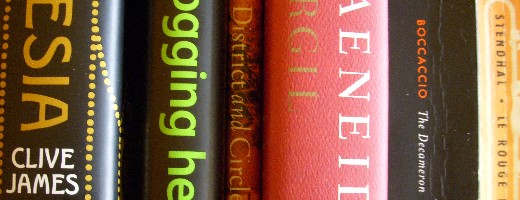Morning Read
¶ As this is no more than a reader’s diary, I’m allowed to make mistakes, I suppose — as long as I catch them quickly. The story of the two Guillaumes the other day (Decameron, IV, ix) was told not by Dioneo but by Filostrato. Dioneo, the cutup, tells naughty stories at the end of each day. So: today’s story about the doctor’s wife and Ruggiero, who drinks an anaesthetic by mistake and wakes up in a chest, placed there by his lady love, the doctor’s wife, who can’t think what else to do with his apparently dead body. Sounds awful, but it’s played for farce. Trying to turn over inside the chest, Ruggiero causes it to fall somehow; it breaks open and he is free. Free for a moment, that is; with his bad reputation, Ruggiero is naturally arrested as a burglar. The commedia dell’arte conclusion involves the lady’s maid singing a pretty song to the magistrate.
The judge saw that she was a tasty-looking dish, and thought he would have just one nibble before listening to what she had to say. Knowing that she would obtain a better hearing, the girl did not object in the slightest, and when the snack was finished, she picked herself up and said:…
Cheeky! I cannot make out the Italian euphemism for the “snack,” but it seems to involve a hook and religious reference. Of course. And on to the Fifth Day!
¶ In the Aeneid, Aeneas finally tracks down the shade of his father, whose ghost prompted him to visit the Underworld in the first place. The river Lethe is explained to him.
¶ District and Circle: Oh, dear, I hadn’t turned the page! I thought that the first sonnet was all there was to the title poem. But no, it goes on. I keep turning the pages. “To George Seferis in the Underworld.” The Internet is a great help. It not only tells me about Seferis, a Greek poet and diplomat whose death in 1971 occurred almost immediately after the setting of this poem, but to the biography that inspired Heaney. I wind up in Liddell & Scott, but don’t learn very much. According to Heaney, aspalathoi are reeds sharp enough to serve as scourges. According to the dictionary, aspalathos is “a sweet-scented shrub.” I also come across an article in the Telegraph that scoffs at Heaney’s professed reference for Gaelic, but I don’t really read it.
¶ Today’s Blogging Hero: Kristin Darguzas, of ParentDish. I feel not unlike Aeneas in the Underworld myself. Parenting blogs! What a universe that must be! I can only wonder what it would have been like to be at home with Megan when she was an infant, only instead of watching soap operas while I took care of her and did the housework (I worked at night, when Megan’s mother came home), I’d had the Internet to check into.
I was explaining the other day to a very doubtful forty-something that car seats had just been invented when Megan was born. They were very simple affairs: plastic baskets, really, given a seat shape and held up with a collapsible wire bracket. Really quite exactly like one of today’s two-handled deli baskets, but shaped a little differently. No upholstery. No straps or safety belts. No rules against using the things in the front seat. And just the day before yesterday, there had been nothing at all. Babies were ferried in a passenger’s arms.
¶ Clive James, nominally on Virginio Rognoni, the Italian minister of the interior who tamed the Red Brigades without resorting to counterterrorism. James’s real subject is the efficacy of terrorism, most notably in the creation of the State of Israel. Italy, he argues, was a functioning democracy when the Brigades began their attack. “But it isn’t hard to name countries, calling themselves democracies, in which injustice, to the idealistic young, seemed so deeply institutionalized that terrorism occurred to them as the only workable response.” Very sobering.

